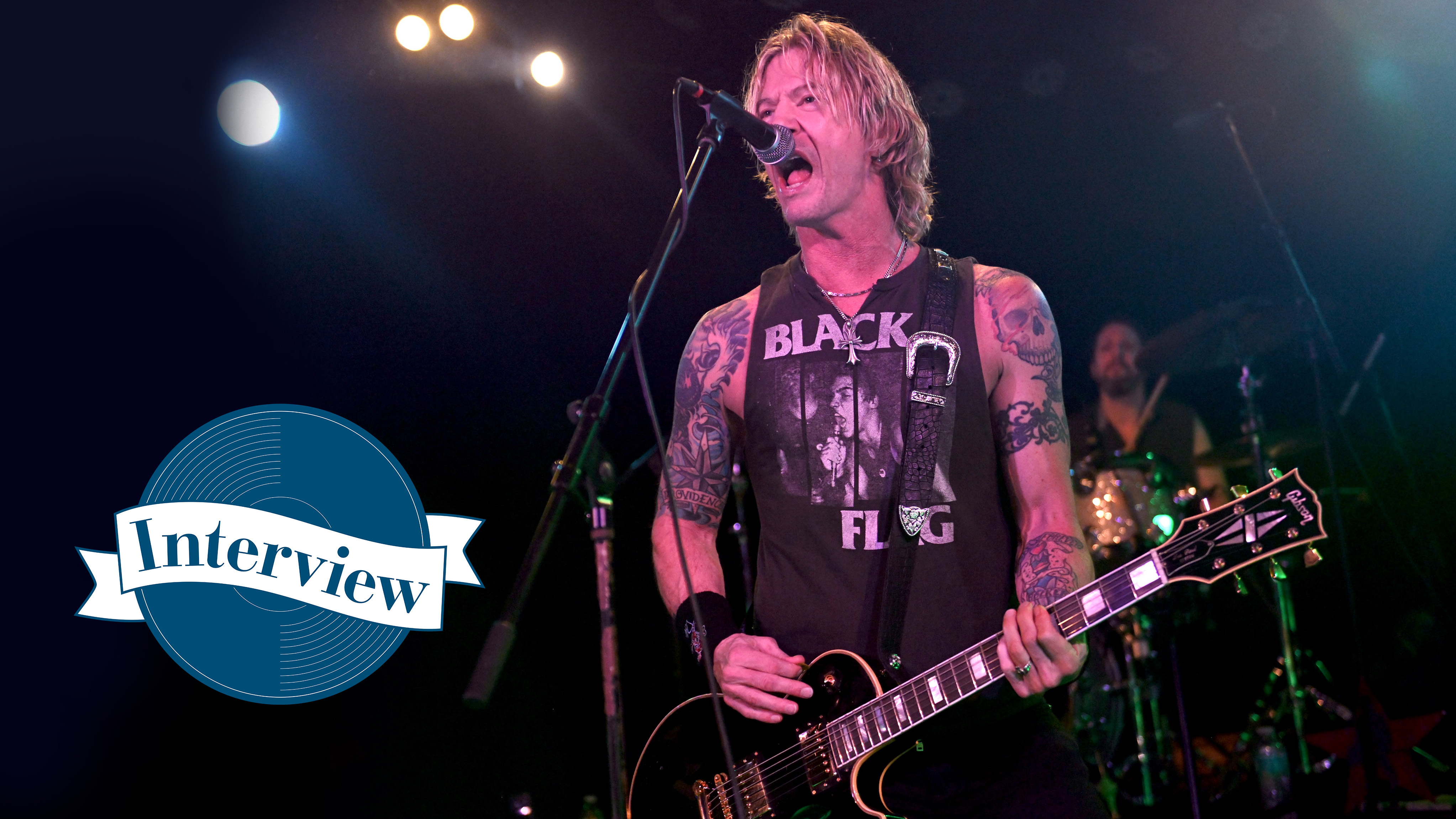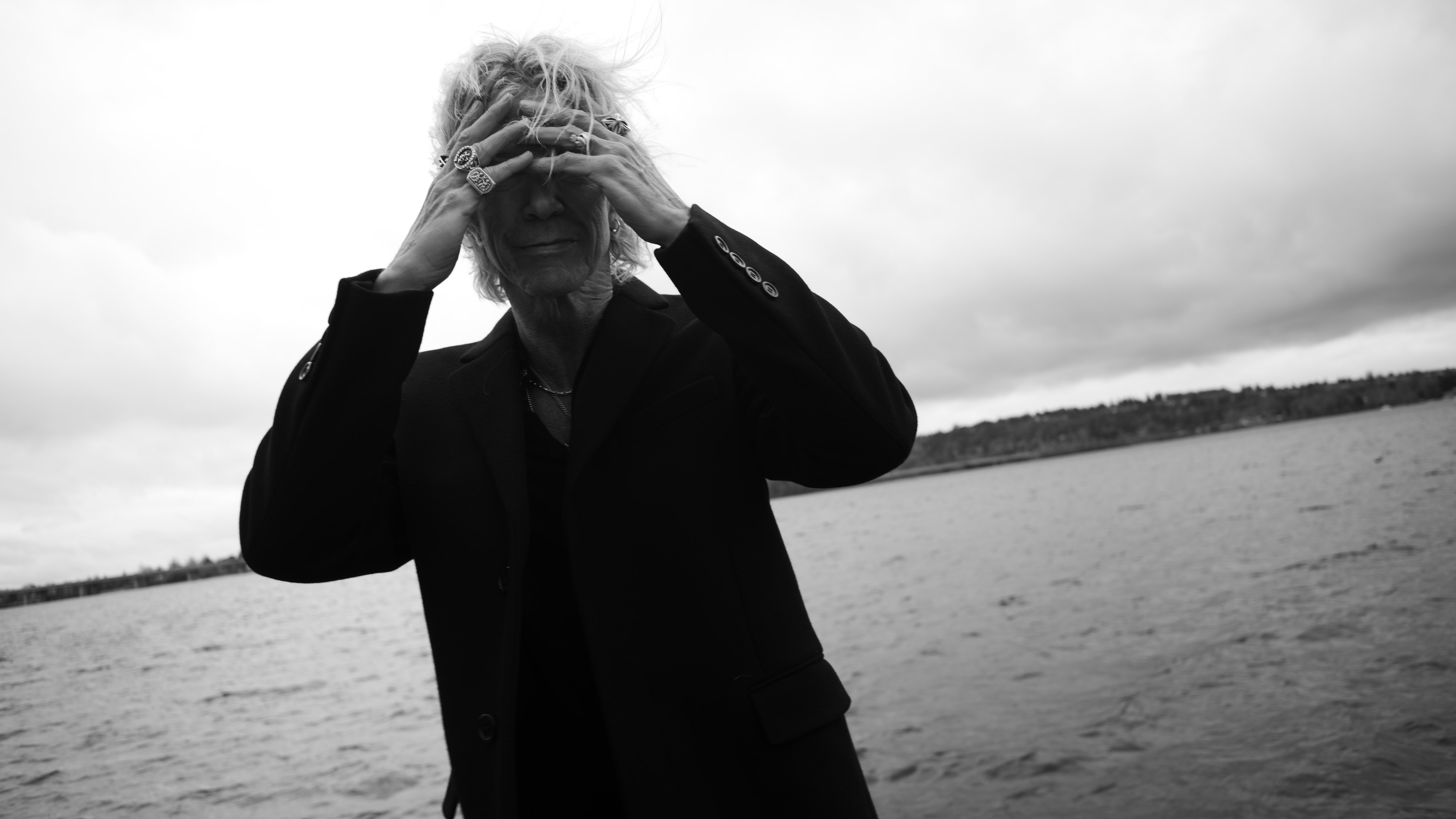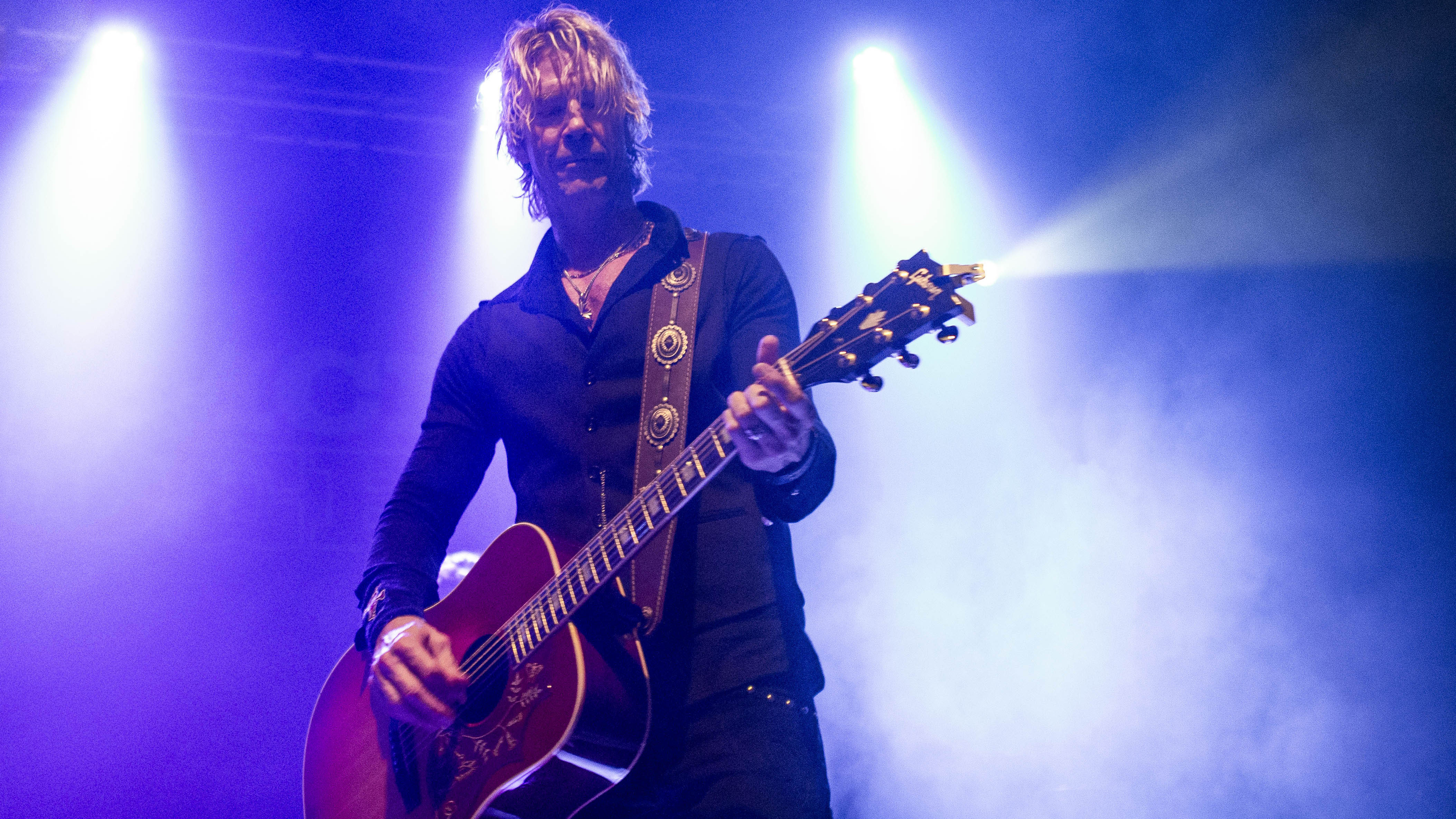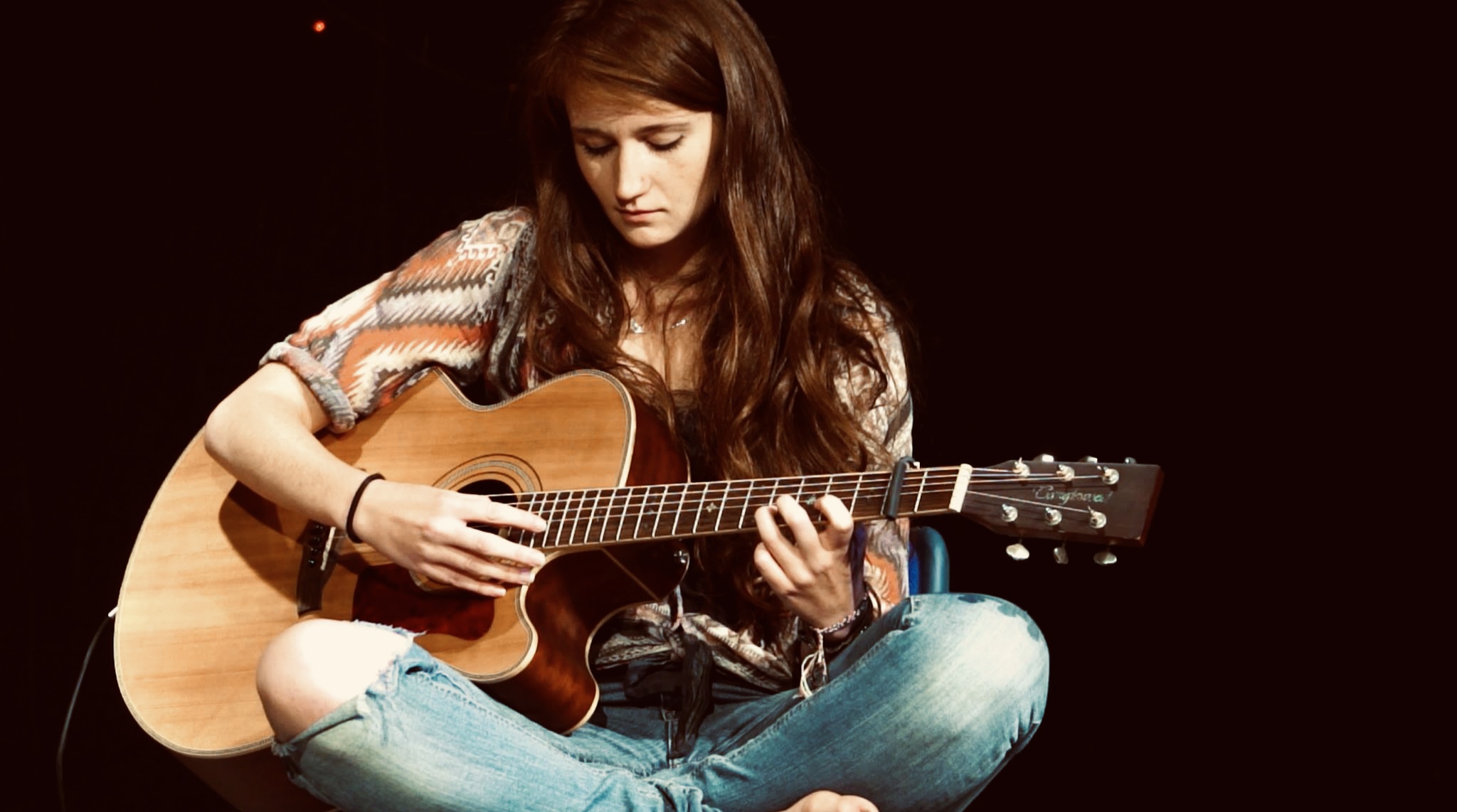Duff McKagan interview: "I wasn’t initially a bass player – I was a guitar player and a drummer. So, my thing’s a little weird. I write left-handed. I play right-handed. There’s a bunch of weird s**t!"
The Guns man talks new solo album Lighthouse, Jerry Cantrell and shares some insider tips: "I do the trick where, about 20 minutes before a show, I eat some potato chips"

Duff McKagan is a man of many talents. When he’s not wielding a bass on vast stages in one of the greatest rock n’ roll bands of all time, you’ll find him channelling his thoughts into books and newspaper columns, practising martial arts, guesting on A-lister’s albums, advising musicians on wealth management, and - of course - adding to his own catalogue of stellar solo material.
The follow-up to 2019’s Americana-hued Tenderness album, the Guns N’ Roses legend now returns with Lighthouse; an all-new 11-track collection that he penned during those lost Covid years.
Recorded at his own Seattle studio, and featuring guest appearances from Slash and Jerry Cantrell, Lighthouse fuses acoustic soul-searching with the same indefatigable rock n’ roll spirit that Duff has always embodied - even though he’s been a clean living advocate for almost three decades now.
Having taken on guitar, bass, drums and vocal duties this time around, we’ve got tons of ground to cover when the rock icon Zooms in from a Texas hotel room, while enjoying a day off in-between back-to-back Guns N’ Roses tour dates.
It goes without saying that Duff’s a busy man, so let’s get right into it…
First of all, how would you describe your new album, Lighthouse?
"Oh my god – nobody’s asked me that! It’s an arc of a story to me, which begins with the song Lighthouse. In the past six or seven years, lyric writing for me has become like a deeper craft. I read such great authors and I have for years, and I’m finally starting to be able to apply that to my lyric writing, and that means I carve at my words the whole time to try to get the clearest meaning in the least amount of words.
Want all the hottest music and gear news, reviews, deals, features and more, direct to your inbox? Sign up here.
I had 60 songs to choose from to build an arc
"I knew Lighthouse was going to be the first song on this record. It has a double meaning; it’s obviously a love song to my wife, but it also can be applied to that beacon of light, hope or goodness that we all strive to get to. Then the last song, I Just Don’t Know is really kind of a pondering of what’s next. So you have this searching for goodness and you have this, ‘Hey, what’s actually fuckin’ next? And how do I fill that in in-between?’
"I had 60 songs to choose from to build an arc – this story if you will – so I pulled out ‘Hope’ because the lyrics really tie in the beginning and the end, Forgiveness and another love song to my wife, Fallen, because I live in such gratefulness."

It’s almost exactly 30 years since your debut solo album came out, and it's safe to say you’ve made some pretty significant lifestyle changes since then. But how would you say your approach to songwriting has changed in that time?
"[First solo album] Believe In Me is a great snapshot; a polaroid of my life then. You can even hear the drugs in my voice and I didn’t really care to learn how to really sing, I just could get on the mic and scream. I was fucked up but I could still play. I played drums on that. I played all the stuff. But, you know, it’s a great snapshot. We’ll leave that there. That’s there and if you want to know what I was like, go ahead and listen to that record! That’ll give you a good idea.
"Then some thousand years later Tenderness comes along and those are songs I wrote in the same vein that I’m writing now on Lighthouse, but I used Shooter Jennings’ band for that. It had pedal steel, he’s got a fiddle player Aubrey [Richmond] and beautiful backup singers. You’re going to get this Americana-feeling record with that band, just by the instruments alone. It was really fun for me to do a record like that, and it was a great way to portray these songs. I love it.
"Then I got my own studio in 2019 in Seattle and I started recording. We got it decked out with my gear and everything hooked up, and I recorded about four or five songs to begin with. I forget which four or five songs those were. But then, I went down to LA because Guns was supposed to do a South American tour and do all this stuff. We start rehearsing and then of course, we start washing our hands, we start leaving doors open and we start wearing masks. We went and did the first show in Mexico City and that was it - the whole world was shut down and we flew home.
"So, I was home in Seattle and we had our daughters with us, our dog and I had my studio. I just started to go finish those songs and I had another 10 songs. Then that two weeks we thought we were going to be off turned into four weeks, and it turned into two months and, as we know, it turned into a couple of years.
"I just kept writing. Like with anything, when you’re writing words, you write 2,000 words and that begets four other thought processes that you could write another 8,000 words on. This happened with my songwriting. I just kept writing songs and recording.
"I had my drum kit there. If you look on Believe In Me on the back of the record, there’s a drum kit there - that’s my drum kit - it’s the same."
Aside from a couple of notable guest appearances that we shall come onto later, did you perform all the guitar and bass parts on Lighthouse?
"Yeah, I mean, I played all the acoustic guitar. I played bass. I played drums on some of it as well. Jamie Douglass [the drummer] from Shooter’s band was able to come up to Seattle a couple of times during the pandemic and I was just like, ‘Okay, I have these nine songs. Can we get these done in two days?’ Of course we can.
I taught myself to fingerpick during the Covid time. I learned to play Blackbird off some guy on YouTube and I was off
"But, for a lot of stuff, he just wasn’t there, so I played drums. I figured out I can play to a click now because I would track everything acoustic guitar-wise to a click and we’d move the click around. I like a chorus to move a little faster. I like those ebbs and flows that are natural in a band, so we just kind of figured out what those were. But, I could play drums to those clicks, which is something I didn’t know if I could ever do! So, I discovered that.
"I taught myself to fingerpick during the Covid time. I learned to play Blackbird off some guy on YouTube and I was off!"
What else have you most enjoyed discovering about the guitar as you’ve been doing more and more songwriting?
"Well, I don’t know. I think acoustic guitar sounds so good in my studio, so I’ve really been trying to [work on] the finer points of acoustic guitar playing. I’m not the greatest, but I've always been a solid rhythm guitar player. Or, I think I have been!
"But acoustic guitar, you know, I’ve always played on Patience and I played acoustic guitar on our Lies record. I’ve played ever since I started playing when I was in sixth grade at 12 years old.
"But, to play acoustic guitar with just a mic and Martin Feveyear up in the window, going: ‘You’re squeakin’!’ Okay, well f**k! Doesn’t everybody squeak? He had me rub my hand on the bridge of my nose to get the natural oil from your skin and get it on there. I started learning all of this stuff, and to play lighter. You know, play fucking lighter. Don’t squeak. How do you not squeak? Maybe clean the guitar neck. I don’t know!"
Could it be to do with muscle you’ve built up from holding down those heavy bass strings all these years?
"Yeah, the switching. We do that in Guns. I go to acoustic guitar for Patience, and after playing bass for the last two hours and forty-five minutes, you have to really think: chill out, get small, be gentle. Because the way I play bass is attack mode.
"But, I’ve really gotten into playing bass. Since around 2008, I was taking lessons and doing all this stuff, like playing with my fingers and learning more about my neck, as far as the notes and just being more comfortable with going places and not thinking that I don’t know. I was never musically trained and never really needed to be, right?
"But you want to know that wherever you’re going on the neck is a correct place to go for whatever key you’re in. So, I’ve been doing that. I got a fretless bass during [Covid] and Slash got me a stand-up bass during that time."

I’ve A/B’ed it to so many Gibson Les Pauls and the Burny just kills it every time!
What’s your guitar collection like?
The main electric guitar I use is a Burny Les Paul, not a Gibson. I’ve A/B’ed it to so many Gibson Les Pauls and the Burny just kills it every time! So, that’s what you hear mainly: a Japanese-made Burny Les Paul from 2000 that I got over there during Loaded.
"They’re kind of illegal. You know, you can’t have a Les Paul rip -off in the States because Gibson frowns upon it!
"I’m definitely a Fender bass guy. I have two models, and they’re not just models because I want to have a model. These are the basses I use in the studio and live. For guitars, I’m all over the place. I have a Fender Telecaster. I’ve got an SG that I love using. You’ve got to know how to play an SG. The necks are thin, and you’ve got to be gentle. The Tele I use is a Jim Root, so it’s a little bit gnarlier. I have some cool old weird guitars that I like to use. They just sound great for whatever song that might be."
Tell us a little about those guest guitar spots on the album…
"There was Tim DiJulio. I don't want to discount what he did for the record. He’s a local guy. He plays with Mike McCready. He’s everybody’s favourite guitar player in Seattle, including Mike McCready. Everybody’s so stoked that I had Tim DiJulio on this record. He’s just this wonderful Mick Ronson-esque / Faces type of player. So he played a lot of the sweet melody leads. Maybe it’s 50:50 on this record between him and I. We called him if I was not getting it, and he would come in and nail it.
"Then, obviously Slash is on Hope. That’s a song I did in 1996 at my house in LA, in the Hollywood Hills. Abe Laboriel [Jr] – the drummer – and I recorded a bunch of songs. He’s with Paul McCartney now, so he’s a big deal! Slash had come over to my house one day and heard that song. It just had my acoustic, it had the bass, I’d sung it, and there was Abe’s drums.
"He was like, ‘Hey man, do you want me to put a guitar on this?’ Yeah, for sure! I had an amp set up and I recorded it. This was back in the days of tape, of course, and I was good enough to record him.
"So, I got those masters back during [Covid]. Again, a lot of things happened during that two-year period of musical freedom for me. I got the masters back for those songs from Geffen and it was a thing they never released.
"Hope was this song and I was looking for lyrical content to make Lighthouse connect to I Just Don’t Know. So, to have Hope in the middle of all that – when you’re dealing with socio-political things like on Just Another Shakedown and God on 10th St.’ - was really a nice bridge lyrically. And it’s a very pretty song. Slash plays thematic things in there. He’s so good at that. He doesn’t remember playing the song. It was during an interesting time in his life!
Jerry fights for his leads
"Then there was Jerry Cantrell. He and I trade a lot of demos back and forth to each other. We’re really good friends. I think one day, he and I will do an acoustic type of record like this. But he was like, ‘Do you want me to put a lead on I Just Don’t Know, man?’ and I was like, ‘I would love for you to put a lead on it.’
"Jerry fights for his leads. I’ve seen so many different guitar players. Some guys can just come in and [do it]. And, wow, that’s fuckin’ amazing. Jerry comes in and he fights. He fights his guitar and, by the end – by the time he gets the lead on – it’s like, ‘Wow man, that was a piece of work. I saw your brain working.’
"He f****n’ swears. He gets through this thing. I’ve seen him do it plenty of times, and I knew he’d do it on that.
"So, those were the three other guitar players: Tim, Slash and Jerry."
Having spent so much time in the company of these fantastic guitar players, what are some of the best lessons that they’ve either literally taught you, or that you’ve picked up just by watching them?
"If I had a guitar in front of me, which I don’t, I could show you things that I’ve learned over the years from other guitar players. I play with Slash every night and both he and Richard [Fortus] are two different styles, but so proficient at what they do.
"I’ll never be that good, but I’ll say, ‘Richard, how’d you do that hammer-on? Let me see that.’ Things like that. I pick up on little extra notes in a chord, or a hammer-on, a passing note and things. Maybe that’s from bass playing or whatever.
"Fingerpicking on guitar just opened up these otherwise normal chords and led me down some other roads to other chording. I don’t even know what the chords are called at the end of the day!"
Do you have any tips for people whose primary instrument is bass, but want to crossover into playing guitar?
"Well, it’s funny with me. I wasn’t initially a bass player. I was initially a guitar player and a drummer. So, my thing’s a little weird. I write left-handed. I play right-handed. There’s a bunch of weird s**t!
"So, asking me about that might be a little weird because, even when I play bass, I still come at it from being a guitar player or a drummer.
"Now, I realise I’m a bass player and I’ve gotten very serious about it – like I said, lessons and whatnot. I mean, as a bass player, here’s what you should learn not to do:
Playing bass in a good band, there’s a certain honour in it
"When a guitar player’s got a f****n’ run at the end of a verse, at the end of a chorus or somewhere, don’t decide that that’s the place for you to whip off a little piece for yourself. And, when the drummer’s doing a fill, you work that out with the drummer. You want to do something with him? Do it with him, but don’t do something against the fill, just because you want to f****n’ play!
"Playing bass in a good band, there’s a certain honour in it. You know, it’s kind of a badass thing. Less is more. Cool fills that make the song better are a thing to work for, and it could be the weirdest f*****g thing. If it makes the song better, then great. But don’t just play to hear yourself f****n’ play – guitar players do a lot of that for you!"
You’ve been out on this huge tour with Guns N’ Roses, and there’s probably no conceivable scenario in which that band would play a small show. Does your solo work give you the opportunity to do more intimate performances and, if so, what do you enjoy about that?
"It does. I did the Tenderness tour and I played 800-1500 [capacity venues]. Maybe bigger than that. I don’t know. It was very intimate and cool. I played this place in London – a place I’d never seen before – it was the Islington Assembly Hall. It’s a beautiful old theatre.
"So, it’s really cool to be able to see everybody up close. You have to play more shows. You have to play every night so you can financially make it work! But yeah, I dig it.
"With Guns, we played a show at the Apollo in Harlem a few years back for a live radio simul-cast and that was really, really cool. The Apollo in Harlem is not that big. It’s a theatre. And we played the Troubadour to start off this whole thing back in 2016. That’s like, 150 people. That’s small!
"I like it all. We just played at the frickin’ Alamodome in San Antonio. That’s as big as it gets. And London Hyde Park. That was ridiculous. So, that’s epic and what you get from the energy of that many people is astounding. It’s a lot to come up on stage and absorb that energy and then turn it, and spit it back out."
What is your pre-gig routine like in terms of warm-ups and exercises?
"Right now, because I’m playing so much bass, we do an hour soundcheck. It’s basically like band practice from, let’s say, 4-5pm. That’s my warm-up. I might have my acoustic guitar in the back and I always do a vocal warm-up. I might just do it on acoustic guitar and sing some songs.
"I do the trick where, about 20 minutes before a show, I eat some potato chips. Not diet potato chips, like regular potato chips because the oil is really good to lubricate your throat - just like the thing with your hand, forehead and the acoustic guitar, I guess!
I chill. I stretch and do all that stuff. Then I do a meditation when I get up on stage that I learned when I first started martial arts. It’s just this thing that kind of centres me, grounds me and prepares me for the energy that you’re about to come around the stage and get in front of.
I have a ‘72 Hummingbird that I played on the Tenderness tour that Slash bought for me for Christmas. He gets me stuff!
What is your acoustic guitar of choice for touring and/or recording?
"That I can take on the road with me, I have just a super cheap Fender – a $300 Fender acoustic. It sounds great, I can write songs on it. Then, what I play for the acoustic part of the set, is a Gibson Hummingbird. A newer one. And I have a ‘72 Hummingbird that I played on the Tenderness tour that Slash bought for me for Christmas. He gets me stuff!
"But I have an old [Harmony H1969] Buck Owens American. You know, those red, white and blue guitars. They were like Sears guitars. Department store guitars. They sound amazing. It has a completely different sound. And what I use in the studio, I use that s**t that’s always worked for me – is that Guild Jumbo from 1988 that I used in the Patience video. That’s still my acoustic guitar."
- Lighthouse is out now, available to buy or stream here
Ellie started dabbling with guitars around the age of seven, then started writing about them roughly two decades later. She has a particular fascination with alternate tunings, is forever hunting for the perfect slide for the smaller-handed guitarist, and derives a sadistic pleasure from bothering her drummer mates with a preference for “f**king wonky” time signatures.
As well as freelancing for MusicRadar, Total Guitar and GuitarWorld.com, she’s an events marketing pro and one of the Directors of a community-owned venue in Bath, UK.
